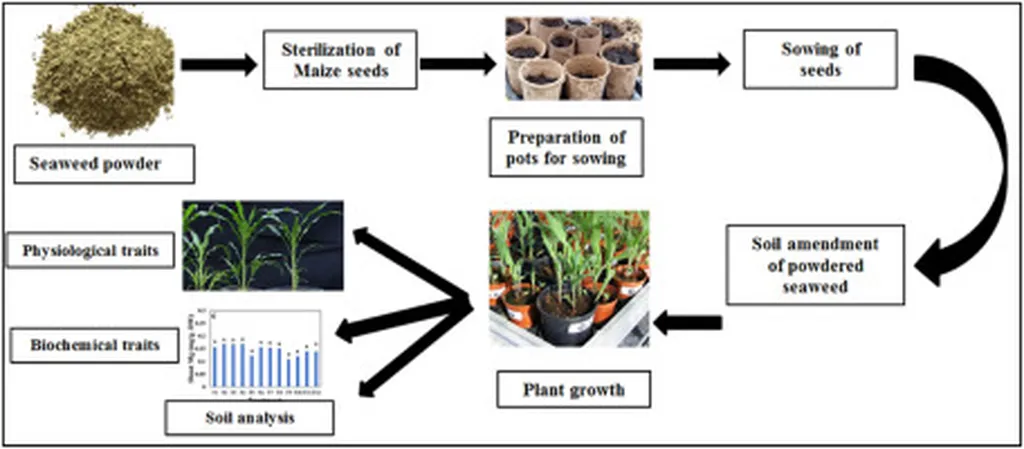In the arid landscapes where agriculture battles the relentless grip of salinity, a beacon of hope emerges from an unlikely source: seaweed. Researchers have discovered that nanoparticles derived from Sargassum tenerrimum, a common brown algae, can significantly enhance maize plants’ tolerance to salt stress, offering a promising solution for farmers in semi-arid regions.
The study, led by Hina Ashraf from the Department of Botany at The Government Sadiq College Women University, explores the potential of algal-based zinc oxide nanoparticles (ZnOSt-NPs) to mitigate the adverse effects of salinity on maize (Zea mays L.), a staple crop worldwide. Published in the journal *Scientific Reports* (translated from English), the research provides compelling evidence that these nanoparticles can boost plant growth and resilience under salt stress.
Maize, particularly at the seedling stage, is highly sensitive to salt stress, which can stunt growth and reduce yields. Ashraf and her team investigated the effects of ZnOSt-NPs on maize plants subjected to 200 mmol kg⁻¹ of NaCl, a level of salinity that mimics the harsh conditions found in many agricultural lands. The nanoparticles were applied at various concentrations (0, 30, 60, and 80 ppm) through foliar spray.
The results were striking. At 80 ppm, the ZnOSt-NPs led to substantial improvements in morphological parameters, including an 18.92% increase in shoot length, an 18.56% boost in root length, and a 38.94% rise in shoot fresh weight. These enhancements suggest that the nanoparticles can help plants maintain their growth and vigor even under saline conditions.
“Our findings indicate that algal-based ZnO nanoparticles can significantly alleviate the harmful effects of salt stress in maize plants,” Ashraf explained. “This could be a game-changer for farmers in semi-arid regions, where salinity is a major constraint to agricultural productivity.”
The study also revealed that the nanoparticles enhanced photosynthetic pigments, with increases of 40.98% in chlorophyll a, 93.55% in chlorophyll b, and 55.38% in total chlorophyll. Chlorophyll fluorescence parameters also showed remarkable improvements, indicating that the plants were better equipped to capture and utilize light energy for growth.
Moreover, the application of ZnOSt-NPs led to a decrease in the levels of antioxidant enzymes and non-enzymatic antioxidants, suggesting that the nanoparticles helped reduce oxidative stress in the plants. The nanoparticles also significantly decreased malondialdehyde (MDA) and hydrogen peroxide (H₂O₂) levels, which are indicators of cellular damage, by 38.40% and 32.80%, respectively. Additionally, the uptake of sodium (Na⁺) and chloride (Cl⁻) ions, which are harmful to plants at high concentrations, was reduced by 34.25% and 38.65%, respectively.
“These nanoparticles not only enhance plant growth but also protect the plants from the damaging effects of salinity,” Ashraf noted. “This dual action makes them a powerful tool for improving agricultural productivity in saline soils.”
The study also found that the nanoparticles increased total soluble proteins by 87.50%, potassium (K⁺) uptake by 77.27%, water content by 74.63%, and the salt tolerance index by 17.12%. These findings highlight the potential of ZnOSt-NPs to enhance overall plant health and resilience under salt stress.
The implications of this research are far-reaching. As global populations grow and arable land becomes scarcer, the need for innovative solutions to improve agricultural productivity in challenging environments is more pressing than ever. Algal-based nanoparticles offer a low-cost, eco-friendly method for managing salinized soils, which could revolutionize farming practices in semi-arid regions.
“This study provides important insights into the potential of algal-based ZnO nanoparticles as a sustainable and effective solution for managing salinity in agriculture,” Ashraf said. “We hope that our findings will pave the way for further research and practical applications in this field.”
As the world grapples with the challenges of climate change and food security, the discovery of algal-based nanoparticles represents a significant step forward in the quest for sustainable agriculture. By harnessing the power of nature, researchers like Hina Ashraf are unlocking new possibilities for enhancing crop resilience and productivity, ensuring a brighter future for farmers and consumers alike.

